|
|
|
Sort Order |
|
|
|
Items / Page
|
|
|
|
|
|
|
| Srl | Item |
| 1 |
ID:
192067
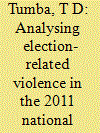

|
|
|
|
|
| Summary/Abstract |
This study seeks to explore the triggers, perpetrators and consequences of electoral violence in the 2011 national elections in the Democratic Republic of Congo (DRC). From the perspective of different domestic and international electoral observers, the 2011 elections in the DRC were marred by violence. A qualitative approach based on secondary resources was employed to achieve the purpose of the study. Following the content analysis of various documents related to electoral violence during the 2011 elections in the DRC, the findings of the study indicated that members of law enforcement and state agencies (police, the national intelligence agency, the Republican Guard and administrative authorities) including supporters of political parties were identified as the main perpetrators of election-related violence in the DRC. In addition, the paper showed that structural causes such as weak institutionalisation of democracy together with lack of national sense of cohesion were the potential triggers of the 2011 election-related violence in the DRC.
|
|
|
|
|
|
|
|
|
|
|
|
|
|
|
|
| 2 |
ID:
095564


|
|
|
|
|
| Publication |
2010.
|
| Summary/Abstract |
Cambodia has been governed by the same, relatively fixed, elite since the Vietnamese removal of the Khmer Rouge from power in early 1979. This article provides an analysis of the dynamic interplay of external and internal factors that have contributed to the perpetuation of this elite's rule in the context of a nominal political and economic transition that might have been expected to undermine the bases of their power. It is argued that the patrimonialism of the Cambodian state and the provision of material aid and political legitimacy by external actors have been central to the endurance of this ruling elite.
|
|
|
|
|
|
|
|
|
|
|
|
|
|
|
|
| 3 |
ID:
168264
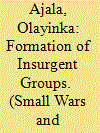

|
|
|
|
|
| Summary/Abstract |
Contrary to earlier notions that religious diversity, ethnicity and the lack of economic development are the main factors responsible for the surge of violence in Nigeria, this article argues that the means of attaining or retaining political authority by politicians are responsible for violent conflicts and the formation of insurgent groups. Using theories of patrimonialism and prebendalism, the article argues that political power and authority are often channelled for personal use in a predatory manner that results in the formation of insurgent groups. The aim of this article is to proffer a different analytical framework for the understanding of the formation of insurgent groups based on political authority.
|
|
|
|
|
|
|
|
|
|
|
|
|
|
|
|
| 4 |
ID:
156094
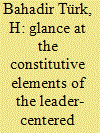

|
|
|
|
|
| Summary/Abstract |
Leadership is a major aspect of Turkish politics; leaders in Turkish politics are regarded as either almost sacred figures or the ultimate reason for all political, social and economic problems. Leaders are seen as decision makers who have a significant impact on almost all aspects of life. It can be contended that a historical continuance toward the leader-centered perspective is present in Turkish politics. This paper aims to present a descriptive framework outlining the elements that constitute the leader-centered perspective in Turkish politics. To accomplish this goal, the paper presents two major arguments. It is argued that the constitutive elements of the leader-centered perspective in Turkish politics are a sui generis synthesis of patrimonialism, patriarchy, populism and militarism. Furthermore, this fourfold historical structure strengthens forms of charismatic leadership and can provide insight into the central role of leadership in Turkish politics.
|
|
|
|
|
|
|
|
|
|
|
|
|
|
|
|
| 5 |
ID:
090858
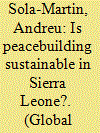

|
|
|
|
|
| Publication |
2009.
|
| Summary/Abstract |
This paper explores the role of the international community in promoting liberal peacebuilding in Sierra Leone. It identifies two key challenges to the sustainability of peacebuilding: insufficient opportunities for the social reintegration of ex-combatants and the escalation in social tensions as a result of the exploitative nature of international mining ventures operating through patrimonial networks. Despite the success of the UN peacekeeping mission to Sierra Leone, the institutionalisation of peacebuilding initiatives by the international community has not addressed the root causes of the conflict. Sierra Leone still lacks basic material capabilities to sustain peace and support development. This paper is based on UN documents, policy reports, relevant literature and field work interviews.
|
|
|
|
|
|
|
|
|
|
|
|
|
|
|
|
| 6 |
ID:
119446
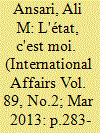

|
|
|
|
|
| Publication |
2013.
|
| Summary/Abstract |
In August 2009, in the aftermath of the popular protests that followed the highly controversial elections of that year, the Iranian authorities arrested hundreds of intellectuals/activists and charged them with sedition against the state.
What was more peculiar was the decision to accuse 'in absentia' a number of western intellectuals for their role in fomenting the crisis, not least the long deceased German sociologist Max Weber. Weber was publicly denounced for his analyses of patrimonialism and sultanism, and their capacity for change. In sum, Weber was being accused of providing the ideological blueprint for 'regime change'.
This article looks at the way in which the concept of 'regime change' has been increasingly used as a political tool to suppress dissent within Iran and argues that far from being seditious, Weber's ideas remain more relevant today in Iran than they ever were. The prospect of 'regime change' remains more a product of the paradoxes of sultanism, than any threat - real or imagined - from abroad.
|
|
|
|
|
|
|
|
|
|
|
|
|
|
|
|
| 7 |
ID:
143570


|
|
|
|
|
| Summary/Abstract |
The disappointing performance of conventional public sector reforms in developing countries has led to the rise of ‘new’ approaches seeking to overcome traditional bureaucratic barriers to change: leadership-focused interventions like the Africa Governance Initiative (AGI); accountability-focused initiatives like the Open Government Partnership (OGP); and adaptation-focused models like those of Africa Power and Politics (APP). While these approaches are appealing to aid donors in their promise to move beyond the limitations of purely formal institution building, they fail to provide new answers to the ‘old’ analytical and practical challenges of public sector reform, in particular administrative patrimonialism, public corruption and political capture. The evidence is yet inchoate, but all points to the need for these approaches to work together with conventional ones. Beyond novel implementation tactics, however, there is a need for new strategies of sustained political support for embattled reformers who face powerful incentives against institutional change.
|
|
|
|
|
|
|
|
|
|
|
|
|
|
|
|
| 8 |
ID:
120923


|
|
|
|
|
| Publication |
2013.
|
| Summary/Abstract |
This article examines the problems of elite capture in community-driven development (CDD). Drawing on two case studies of non-governmental organisation (NGO) intervention in rural Mozambique, the authors consider two important variables - (1) the diverse and complex contributions of local elites to CDD in different locations and (2) the roles that non-elites play in monitoring and controlling leader activities - to argue that donors should be cautious about automatically assuming the prevalence of malevolent patrimonialism and its ill-effects in their projects. This is because the 'checks and balances' on elite behaviour that exist within locally defined and historically rooted forms of community-based governance are likely to be more effective than those introduced by the external intervener.
|
|
|
|
|
|
|
|
|
|
|
|
|
|
|
|
| 9 |
ID:
148548
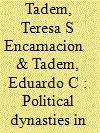

|
|
|
|
|
| Summary/Abstract |
The results of the 2013 Philippine mid-term elections highlighted the dominance of political dynasties in the country. With all 80 provinces littered with political families, 74 percent of the elected members of the House of Representatives came from such dynastic groups. Despite overwhelming recognition that political dynasties breed patronage politics and corruption, no substantial steps have been undertaken to address this issue. This article examines the general nature of Philippine political dynasties, the reasons for their continuing existence and their adverse impact on the country. This problem emanates basically from three factors: (1) the political and socio-economic foundations upon which political dynasties are built; 2) the inability to effectively implement Philippine constitutional provisions by enacting an enabling law; and 3) the weakness of potential countervailing forces that would challenge political dynasties.
|
|
|
|
|
|
|
|
|
|
|
|
|
|
|
|
| 10 |
ID:
163233
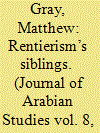

|
|
|
|
|
| Summary/Abstract |
his paper examines rentier state theory (RST), and specifically “rentierism” as a more refined and nuanced variant of RST, arguing that while rentierism provides considerable utility in explaining the state-society relationships of the contemporary Arab states of the Persian Gulf, it is insufficient as a stand-alone explanation, and needs to be considered as a political dynamic of the state-society relationship, rather than as a structural explanation for the state itself, as early RST more ambitiously sought to do. Rentierism therefore needs to be utilized in combination with two other explanatory frameworks, neopatrimonialism and state capitalism. In effect, these are rentierism’s theoretical “siblings”: they sharpen a rentier analysis by providing greater nuance about how elite networks, business-government relations, and personalized politics operate and interact in the allocative settings of the Gulf, as well as illustrating both the scope and the limits of rentierism as an explanatory framework.
|
|
|
|
|
|
|
|
|
|
|
|
|
|
|
|
| 11 |
ID:
152076


|
|
|
|
|
| Summary/Abstract |
This article discusses the assumptions underlying state-building efforts and the effects of these efforts. It addresses two main questions: why has state building not led to the establishment of effective states? And what are the effects of statebuilding? It is argued that these efforts have been based on an institutionalist model of the state derived from a Weberian framework, and that the basic reason why state building has failed is that the creation of effective states requires the creation of state-centred societies, where both material and symbolic resources are concentrated in the state. This is very difficult to achieve for external actors. But, although state building has not achieved the kinds of effects associated with effective states, it has nevertheless had significant effects. These include, first, accentuating the patrimonialism which has led to state weakness in the first place; second, reductions in national sovereignty as external actors’ substantial influence on policy agendas renders the state itself subject to control and regulation by actors external to it; and, third, perpetuating the idea of the state, while undermining the possibility of creating actual states which conform to this idea.
|
|
|
|
|
|
|
|
|
|
|
|
|
|
|
|
|
|
|
|
|